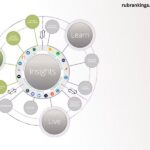In today’s fast-paced, interconnected world, the term “digital citizen” has emerged as a vital concept, encapsulating the idea of individuals leveraging technology to enhance their productivity and efficiency. A digital citizen is not just someone who uses technology; they are individuals who navigate the digital landscape thoughtfully and responsibly, utilizing various tools and platforms to optimize their work and personal lives. This article explores how digital citizens use technology to be more productive and efficient, examining tools, strategies, and best practices that foster a proactive digital lifestyle.
Understanding Digital Citizenship
Digital citizenship encompasses the norms of appropriate and responsible behavior when using technology. It includes a range of skills and practices that enable individuals to engage effectively with digital tools while promoting respect, security, and critical thinking. A digital citizen is characterized by their ability to communicate, collaborate, and create in the digital world, while also being aware of their digital footprint and online privacy.
The Role of Technology in Productivity
Technology is a double-edged sword; it can either distract us or propel us toward our goals. Digital citizens use technology to streamline processes, enhance communication, and automate repetitive tasks. By embracing the right tools and strategies, individuals can significantly boost their productivity. Here are several areas where technology plays a crucial role in productivity:
- Task Management ToolsDigital citizens often rely on task management applications like Trello, Asana, or Todoist to organize their tasks and projects. These platforms allow users to create to-do lists, set deadlines, and prioritize tasks based on urgency. The visual organization of tasks can improve focus and motivation, making it easier to track progress and stay accountable.
- Cloud ComputingCloud-based solutions such as Google Drive, Dropbox, and Microsoft OneDrive provide digital citizens with the ability to store, share, and collaborate on documents from anywhere. This flexibility not only enhances productivity but also supports remote work and collaboration across different time zones. The ease of accessing files on various devices ensures that important documents are always at hand.
- Communication ToolsEffective communication is essential for productivity, especially in remote work settings. Platforms like Slack, Microsoft Teams, and Zoom facilitate seamless communication among team members. These tools offer features like video conferencing, instant messaging, and file sharing, making it easier for digital citizens to collaborate in real-time, regardless of their physical locations.
- Automation and IntegrationAutomation tools like Zapier and IFTTT (If This Then That) enable digital citizens to streamline repetitive tasks by connecting different applications. For example, automating the process of saving email attachments to a cloud storage service or sending reminders for upcoming meetings can save valuable time. By integrating various applications, users can create a cohesive workflow that enhances efficiency.
- Time Management TechniquesDigital citizens often employ time management techniques like the Pomodoro Technique or time blocking to maximize their productivity. The Pomodoro Technique involves working in focused intervals (typically 25 minutes) followed by short breaks, which helps maintain concentration and prevent burnout. Time blocking, on the other hand, involves scheduling specific time slots for different tasks, ensuring dedicated focus on each activity.
Strategies for Becoming a More Productive Digital Citizen
To become a more productive digital citizen, it is essential to adopt specific strategies that leverage technology effectively. Here are some actionable tips for enhancing productivity in a digital environment:
- Set Clear GoalsClear, measurable goals provide direction and motivation. Digital citizens should regularly set short-term and long-term goals, breaking them down into actionable steps. Using SMART criteria (Specific, Measurable, Achievable, Relevant, Time-bound) can help clarify objectives and create a roadmap for success.
- Prioritize TasksNot all tasks hold equal importance. Digital citizens can benefit from prioritizing their workload by using techniques like the Eisenhower Matrix, which categorizes tasks based on urgency and importance. Focusing on high-priority tasks first ensures that energy is directed toward what matters most.
- Limit DistractionsThe digital landscape is rife with distractions, from social media notifications to constant emails. Digital citizens should take proactive steps to minimize distractions. Techniques like turning off non-essential notifications, using website blockers during work hours, and creating a designated workspace can help maintain focus.
- Embrace Lifelong LearningThe technology landscape is continually evolving, and digital citizens should embrace lifelong learning to keep their skills sharp. Online courses, webinars, and podcasts can provide valuable insights into new tools and trends, empowering individuals to adapt and innovate in their personal and professional lives.
- Foster CollaborationCollaboration is a key aspect of productivity in the digital age. Digital citizens should actively seek opportunities to work with others, leveraging collaborative tools to share ideas, brainstorm solutions, and achieve common goals. Effective teamwork can lead to greater innovation and improved outcomes.
- Practice Self-CareMaintaining productivity is not solely about working harder; it’s also about working smarter. Digital citizens should prioritize self-care, ensuring that they take breaks, practice mindfulness, and maintain a healthy work-life balance. This holistic approach can enhance focus and overall well-being, leading to sustained productivity.
The Importance of Digital Literacy
To be an effective digital citizen, one must possess a certain level of digital literacy. This includes understanding how to use various technologies, recognizing reliable sources of information, and knowing how to protect oneself online. Digital literacy empowers individuals to navigate the digital landscape confidently, making informed decisions about the tools they use and the information they consume.
- Understanding Online SecurityAs digital citizens interact with various online platforms, understanding online security becomes paramount. Knowledge of best practices such as using strong passwords, enabling two-factor authentication, and being aware of phishing scams is essential. Digital citizens should take proactive measures to protect their personal information and digital identity.
- Evaluating Sources of InformationIn an age of information overload, the ability to evaluate sources critically is crucial. Digital citizens should cultivate media literacy skills, enabling them to discern credible information from misinformation. This involves checking the reliability of sources, recognizing biases, and understanding the context of the information presented.
- Engaging Responsibly on Social MediaSocial media platforms offer a powerful means of communication and connection, but they also come with risks. Digital citizens should engage responsibly by being mindful of their online presence and the content they share. This includes understanding privacy settings, being respectful in interactions, and contributing positively to online communities.
Conclusion
In the modern world, being a digital citizen means embracing technology to enhance productivity and efficiency while navigating the complexities of the digital landscape responsibly. By utilizing task management tools, cloud computing, and communication platforms, individuals can optimize their workflows and collaborate effectively. Moreover, adopting strategies for goal setting, time management, and self-care can further amplify productivity.
Digital citizenship also requires a commitment to lifelong learning and digital literacy. As technology continues to evolve, so too must our skills and understanding of its implications. By fostering a culture of responsible technology use, digital citizens can not only enhance their own productivity but also contribute positively to their communities and the broader digital environment.
Ultimately, becoming a more productive digital citizen is not just about the tools we use but also about the mindset we cultivate. Embracing a proactive, informed approach to technology can lead to a more fulfilling and efficient digital experience, empowering individuals to achieve their personal and professional aspirations in an increasingly interconnected world.



